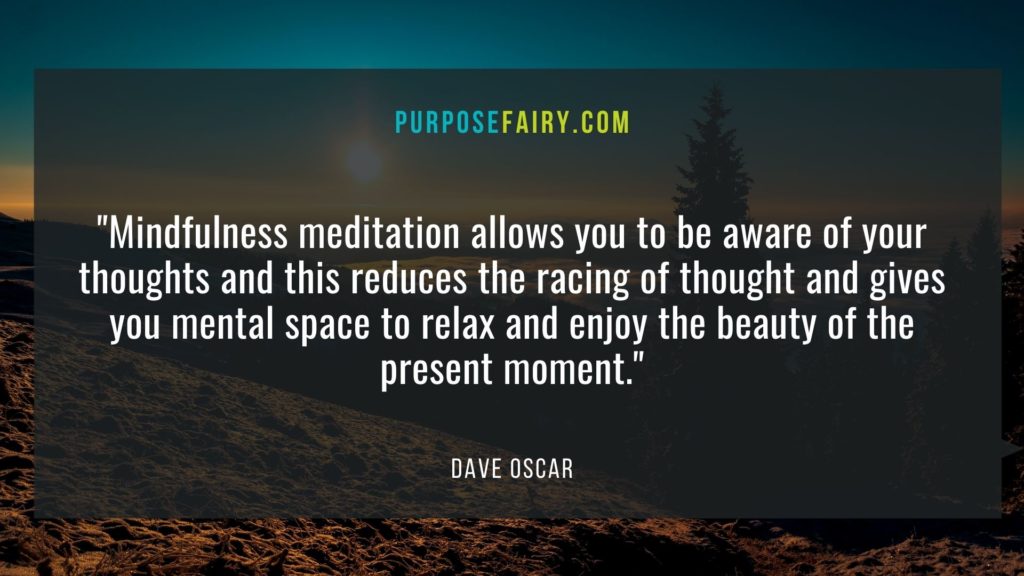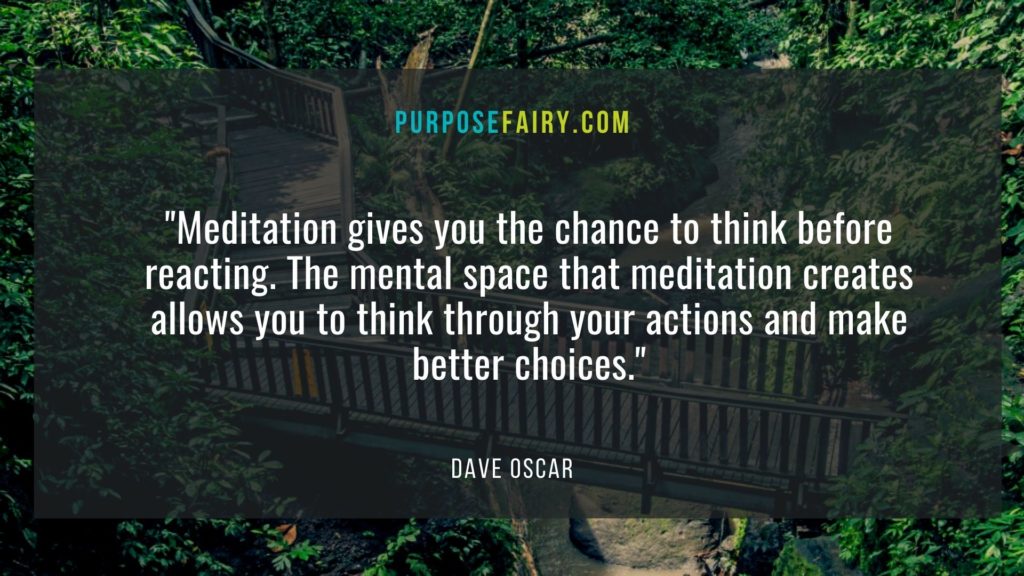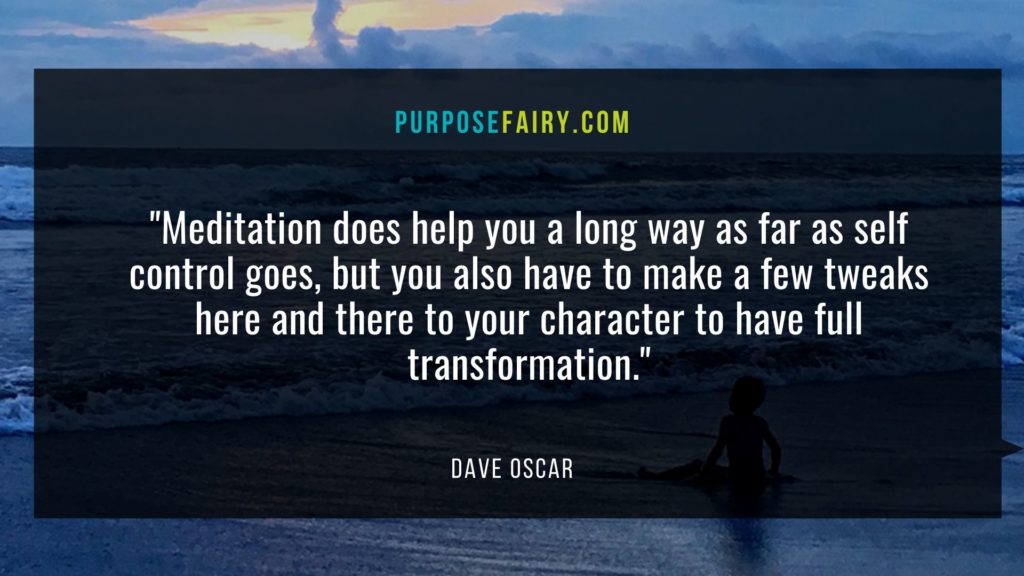
“If you can’t control your mind everything and everyone else will.”~ Dr. Joe Dispenza
As a person who has been meditating for years, I would say meditation is one of the greatest practices and gifts to humanity. It has helped me redefine my life from feeling lost, confused, anxious, and restless to being confident, calm, composed, and feeling in control of my life.
Meditation comes with many mental, physical, emotional, and spiritual benefits. And one of the benefits that has stood out for me is self control.
As I was slowly becoming an adult, I noticed that I barely had control of myself and my life in general. I was doing things I never wanted to and really didn’t have that inner strength to stop and make a change.
“Self control is the chief element in self respect, and self respect is the chief element in courage.” ~ Thucydides, History of the Peloponnesian War
However, after I discovered meditation and mindfulness and got heavily involved with them, my life started transforming.
I gained confidence, mental clarity, control over my mind and body and even felt more fulfilled as a person.
And for this reason, I feel I should share with you how meditation has helped me gain self control over the years and made me a healthy and happier person than I was.
Here are the 5 ways meditation has strengthened my self control and given me the power to drive my life in the right direction without too much struggle.
5 Powerful Ways in Which Meditation Helps You Gain Self Control
1. Mental self control (Thoughts)
One of the things that throw us out of balance as human beings is thought. We are always having thoughts racing in our minds. We move from one thought to another.
On the one hand, we are trying to figure out how we are going to succeed financially and see that our families live better lives.
On the other hand, we also worry if our health is good and if our family members are healthy too.
We are also weighed down by thoughts of other things including what the future holds for us, how we are going to solve a problem that is threatening some aspect of our lives, how long we will live, how much we will enjoy our lives, and many other things.
And the worst part is, we don’t even get the chance to fully explore these thoughts as others come up as we trying to chase a certain thought. So we find ourselves mentally restless and always anxious and tense.
This in the long term affects our peace of mind, judgment, focus, and productivity, to name a few.
“Educate your children to self control, to the habit of holding passion and prejudice and evil tendencies subject to an upright and reasoning will, and you have done much to abolish misery from their future and crimes from society.” ~ Benjamin Franklin
Now meditation helps reduce the racing thoughts and the constant mental chatter and allows us to have a moment of peace and rest.
self control
There are different styles of meditation and they all help with this in different ways.
For instance, mindfulness meditation allows you to be aware of your thoughts and this reduces the racing of thought and gives you mental space to relax and enjoy the beauty of the present moment.

By being in the “now” moment, you cease worrying about the future or regretting the past, which makes the highest percentage of the mental chatter.
With this away, you are more able to perceive and interact with the present moment with more sobriety and do things better than you would when stressed by your thoughts.
And this is a step towards taking control of your life.
2. Emotional self control (Feelings)
Feelings are a big part of our lives and we often listen to them more than we listen to our minds. When someone dies, it is difficult to comprehend it and we often get lost in deep sorrow while imagining that we won’t ever see the deceased on the face of the earth.
Deep down, we know that this is our fate too and that is the nature of life. But grief gets the best of us, and sometimes, people die of it if they were attached to the deceased and can’t seem to let go.
The same goes for other emotions like temper and anxiety.
In the case of temper, we know that it can lead to regret and we also know that things we are anxious about will, later on, be solved but we often can’t control our feelings and make them align with our knowledge.
Meditation here comes in handy since it helps regulate our emotions and let our minds be above our feelings. And this makes our grief, anxiety, temper, and all the other emotions that negatively affect our lives become more tolerable.
A person who meditates often is more able to control themselves than someone who doesn’t.
3. Reaction control (Acting and Reacting)
How we respond physically to situations defines us a great deal and also contributes to our future experiences.
If someone insults you or punches you in the face, what you do next may determine whether you sleep peacefully that night and a few more to come or not.
You can choose to remain quiet and seek justice from the authorities or you can choose to give an eye for an eye and a tooth for a tooth and get yourself behind bars in a couple of minutes.
“Very often in everyday life one sees that by losing one’s temper with someone who has already lost his, one does not gain anything but only sets out upon the path of stupidity. He who has enough self control to stand firm at the moment when the other person is in a temper, wins in the end. It is not he who has spoken a hundred words aloud who has won; it is he who has perhaps spoken only one word.” ~ Hazrat Inayat Khan, Mastery through Accomplishment
Most people tend to want to make a statement by using their strength and fighting back without even thinking twice about it. And since revenge is part of human nature, we end up in more trouble than we thought.
Meditation gives you the chance to think before reacting. The mental space that meditation creates allows you to think through your actions and make better choices.

4. Speech Control
Speaking without caution has been the ruin of thousands of people across the world.
Some people have lost their jobs, others have brought upon themselves endless regret, others broke good relationships, others gave away their secrets and destroyed themselves and others got into fights and permanently injured themselves.
Needless to say, it is true what they say, “A whip can raise a welt but a vicious tongue can break bones”
All of us can admit that we have had some moments where we said something we didn’t want to and later on suffered for it.
Everyone would want to have that power to say what they want to when they want to, and the way they want to, that will protect them from trouble.
Well, meditation is among the tools that can help with that.
The aim here is to be aware of what you say and think before you open your mouth, and meditation makes that possible for you.
Through consistent meditation, you become more mindful of your speech and prevent yourself from speaking subconsciously and uttering some words you are used to that you know can get you in a mess.
I have personally experienced how being in a meditative state can help you determine when to speak and when to remain silent and also to be aware of the people you are speaking to and address them with the honor and respect they deserve.
5. Attention Control
When your mind is full of thoughts, you don’t usually have your full attention on the task that you may be doing. Concentrating and remaining focused in such scenarios becomes hard.
This results in low productivity at work and school. It also affects our relationships with others.
To tackle this, you should consider doing meditation, as research has found that it improves attention, concentration, and focus, which also causes fulfillment in the task you are doing.
How I Gained Self Control And How I Maintain it
While I have not fully mastered self control over these areas, I have been able to gain good control over most of them. And the approach I used to make these improvements is through frequent meditation, consistent effort, and discipline.
I do mindfulness meditation daily for about 15 minutes in the morning and 5 minutes of focused attention meditation in the evening.
I have found that these help me have proper self control of my day in terms of how I go about handling the tasks I have for the day.
Since mindfulness meditation is not enough, I also aim to remain mindful through other mindfulness-based exercises such as mindful eating, mindful speaking, mindful listening, mindful walking, visualization, and resting awareness (where you observe yourself when you are relaxing).
These simple additions have deepened my level of mindfulness over time.
On top of that, I make an effort of thinking deeply about situations, the things that are troubling me, the areas I fall short in, in terms of character, and through awareness, I intentionally work towards rectifying these areas.

When I decide to work on a certain area, I apply discipline and prepare myself for the misery that will come as I work towards overcoming the problem and stick through it until I make a permanent change.
Meditation does help you a long way as far as self control goes, but you also have to make a few tweaks here and there to your character to have full transformation.
In summary, meditation is a practice that can truly uplift your life. A practice that changes and improves your experience of life more than you would imagine.
It can take you from self-defeat to victory if you let it.
It all begins with making a decision to begin meditating and following that with action. And with some action every day without procrastination, you will slowly start to enjoy its benefits.
Sparing 1 to 5 minutes each day for meditation is possible with the aim of improving self control, and if you commit yourself to it, a few months from now you will be loving the person you will be evolving into.
Also, start identifying the areas in your life you feel you don’t have control over and aim to use mindfulness and applied effort to improve them.
These techniques are quite rewarding in the long term.
Also, remember that good things take time and by doing meditation in the long term, you are sure to experience the peace of mind and good control over your life that this simple practice offers.
Comments
Dave Oscar
David is a huge meditation and mindfulness enthusiast. He is also a mental health researcher and the editor of improveyourbrainpower.org, a website that shares the legitimate and effective ways to improve the power and function of the brain.
read more